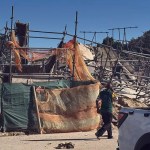MARITIME PROTECTION
South Africa supports decarbonisation of shipping industry — in a lukewarm kind of way

The South African delegation to the 80th Maritime Environment Protection Committee announced its support for the decarbonisation agenda of the shipping industry, but expressed reservations about the associated costs.
The second day of the 80th Marine Environment Protection Committee (MEPC 80) meeting in London saw South Africa state its position on the negotiations set to lay the path for the shipping industry to decrease and eventually eliminate greenhouse gas emissions.
South Africa’s position on the talks, which conclude on Friday, was largely aligned with those of South American countries, Russia and Bangladesh, which have collectively backed unambitious targets that use weak language around the agenda for decarbonisation by 2050.
Read more in Daily Maverick: The lowdown on the 79th Marine Environment Protection Committee and why you should care
Among the reasons for an unambitious stance by South Africa are concerns that a proposed carbon levy would have negative economic impacts on the country.
The MEPC 80 discussions are expected to begin setting the shipping industry’s decarbonisation agenda, but the way forward has been unclear. Some countries and organisations are calling for an ambitious final text that would include interim goals in 2030 and 2040 ahead of complete decarbonisation by 2050. Others say that the technology and measures that will aid the industry to decarbonise are going to cost more than they can afford, and are delaying progress.
Read more in Daily Maverick: Maritime Environment Protection Committee fails to set the course for shipping industry’s decarbonisation targets
“We support a basket of measures and are eager to progress this work. As we progress this work, we remain committed to preventing negative impacts on countries including LDCs and SIDS [least developed countries and small island developing states],” said South Africa at the plenary.
“South Africa and other counties in the Global South will find it hard to remain competitive in a world in which tariffs increase prices. Unless we find a basket [of measures] that can reduce emissions in the least impactful way, we will face unemployment, inequality and poverty — especially amongst the youth in our populations.”
Regarding the carbon levy, which was previously suggested at $100 per tonne of carbon (though $400-450/tonne of carbon is suggested for any impact on emissions of the shipping industry), the South African delegation said they had opted to conduct a comprehensive impact assessment; a detailed study that could take years to complete. This is considered to be a delaying tactic to avoid taking action on decarbonisation.
Setting ambitious decarbonisation goals could encourage investment into alternative fuel development and infrastructure for alternative fuel energy, as well as the building of ships that can make use of the alternative fuels and spur more ambitious decarbonisation goals and action.
Green hydrogen
South Africa has been at the forefront of developing its green hydrogen energy sector — a possible fuel alternative being looked into for the shipping industry and energy sectors. Most recently, South Africa, Denmark and the Netherlands launched a $1-billion fund to further develop green hydrogen.
Read more in Daily Maverick: SA launches $1bn green hydrogen fund with Netherlands, Denmark to tackle climate crisis
“We also advocate for a just transition to new fuels that can provide finance for adaptation, including infrastructure changes that need to happen. South Africa is doing its part. South Africa is engaging in several initiatives related to [zero emission] fuels, and green hydrogen in particular. Our green hydrogen roadmap is under development,” the country said.
South Africa often aligns itself with other developing countries that have low historic emissions and yet are the most affected by the effects of the climate crisis.
Across the African continent however, South Africa has the highest emissions and the Durban shipping port, which is the busiest in Africa, also produces the highest emissions on the continent.
But being a middle-income country, South Africa often argues that to reduce these emissions, the country needs financial aid. The success of this call has been evident in the Just Energy Transition Investment Plan that laid the pathway for how the country can move away from a heavily coal-reliant energy grid to cleaner and greener energy solutions.
South Africa said it continues to advocate for common, but differentiated responsibilities, which holds that those most responsible for emissions should bear the cost. DM/OBP
To read all about Daily Maverick’s recent The Gathering: Earth Edition, click here.
















 Become an Insider
Become an Insider
Comments - Please login in order to comment.